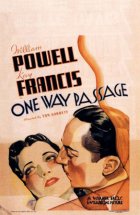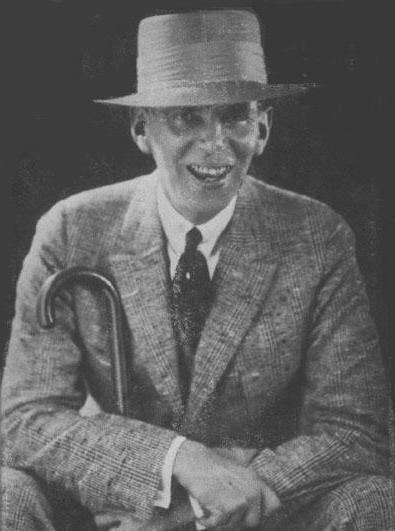
One Way Passage
- UNRATED
- Year:
- 1932
- 67 min
- 511 Views
MAIN TITLES:
over an ocean liner anchored in a harbor.
DISSOLVE TO:
IMAGES:
of the cast with their names and roles SUPERIMPOSED, over which we hear the
film's love theme.
FADE OUT:
FADE IN:
EXT. HONG KONG - DAY
A couple of shots from stock footage of the city.
SUPERIMPOSED text reads: HONGKONG
DISSOLVE TO:
INT. SALOON - DAY
Swinging doors open as the CAMERA TRACKS THROUGH them and into the crowded
barroom. It's lunchtime on November, 21, 1932, and the place is full of
Westerners, mostly civilians but also some scattered sailors. We hear a trio
singing "If I Had My Way," a pop ballad from 1913. We have missed the first
line of the chorus ("If I had my way, dear, forever there'd be") but it hardly
matters:
TRIO:
(singing lustily)
A garden of roses for you and for me ...
We PAN OVER to a piano keyboard where a burning cigarette is balanced upright
on the next-to-last key. The pianist, accompanying the singers, snatches the
butt and takes a drag.
TRIO:
A thousand and one things, dear, I would do ...
We PAN OVER to the trio standing in a corner by the swinging doors -- three
ugly, heavyset Westerners, two men and a woman. Someone tosses them a coin
from off screen and the guy in the center fails to catch it. He has to bend
over to pick it up off the floor.
TRIO:
Just for you, just for you, just for you.
Another coin is thrown. This time, the guy on the left fails to catch it. The
coin falls toward the floor with a loud metallic clank. The singers look down
at the floor. We PAN DOWN just long enough to reveal a spittoon near the
singers' feet, then PAN BACK UP to the singers who reluctantly decide not to
retrieve that particular coin. Never once during all this do they miss a note.
TRIO:
If I had my way, you would never grow old,
And sunshine I'd bring every day ...
On the word "day," a female patron approaches the heavy woman and whispers a
question in her ear. Conveniently, there is a pause in the song, just long
enough for the singer to reply:
HEAVY WOMAN:
(brusquely)
First door to your left, dearie.
The female patron departs. We TRACK DOWN the crowded bar and see: two sailors
and a bartender toasting one another with huge glasses of beer; a bartender
pouring drinks for other sailors and their "dates"; various civilian men and
women wearing the latest styles; uniformed chauffeurs; ship's officers and
crew of various nationalities; etc. At one point, we briefly glimpse someone
carrying away the spittoon to retrieve the coin.
TRIO:
Like a queen on a throne,
If I had my way.
The song ends. Patrons applaud. We PAUSE at a middle-aged American bartender
mixing a complicated drink. He grins and speaks to an unseen patron who sits
at the bar, just off screen.
BARTENDER #1
I haven't made one of these since
the Fourth of July.
In the background, we hear the trio begin a new song, another standard, this
one from 1918:
"Till We Meet Again." The bartender takes a long whiff of thedrink's aroma and adds some more ingredients.
BARTENDER #1
I was makin' one when the quake hit
'Frisco.
The bartender stirs the drink expertly and glances around.
BARTENDER #1
Believe me, friend, I wouldn't go to
all this trouble for any of these
foreigners.
With great pride, he adds a few finishing touches, pours the contents into a
glass and tops it off with an olive. The unseen patron's hand reaches in to
pick up the glass but the bartender raises a finger at him.
BARTENDER #1
Uh uh. Gotta wait a minute to let
the oil sink in.
The patron withdraws his hand. Tossing a lemon slice behind his back and
catching it in midair, the bartender twists it with a flourish over the glass.
He inspects the drink closely, glances at the patron, then gives the lemon
slice another grand twist before proudly sliding the glass away.
Simultaneously, we hear the trio conclude their song to much applause.
BARTENDER #1
There you are, partner. You can tell
your grandchildren about that one.
Finally, we catch our first sight of the patron, DAN HARDESTY, a handsome
thirtyish American man, as he puts the glass to his lips. But before he can
drink he's bumped into from behind by a woman with her back to him. Half the
drink spills out and ends up on the floor. Dan turns angrily to the woman who
wears a big floppy hat.
DAN:
Say, what in the name of--?!
The woman, a dark-haired American beauty named JOAN AMES, also turns and the
two come face to face. She, too, has spilled some of her drink and is wide-
eyed with anger. But as soon as their eyes meet, their attitudes change.
Both are somehow instantly smitten.
And both realize they are holding the same obscure cocktail.
In the background, we hear the pianist play the film's bittersweet love theme.
After a pause, Joan finds her voice first.
JOAN:
Why, I'm so sorry.
DAN:
(a slight grin)
I'm so glad.
JOAN:
(off his glass)
Such a beautiful drink, too.
DAN:
Yes. Paradise cocktail.
(glances at his)
Seem to be a few drops left.
JOAN:
(steadily)
Always the most precious, the last
few drops. That's luck.
DAN:
(surprised)
Yes.
(beat)
Uh, my name is Dan.
JOAN:
Mine's Joan.
DAN:
Hello, Joan.
JOAN:
Hello, Dan.
They shake hands like old friends.
DAN:
May we, er, drink to our meeting?
JOAN:
We should.
(raises her glass)
Here's... Here's "hail and farewell."
DAN:
Oh, that seems a bit ruthless.
Let's say, uh--
Abruptly, two German voices drift in from the crowd -- apparently a couple of
sailors saying "till we meet again" to each other -- "Auf wiedersehen!" "Auf
wiedersehen!" -- Dan glances in their direction, then turns back to Joan and
raises his glass, inspired.
DAN:
Auf wiedersehen.
Joan looks at Dan sadly for a beat and then agrees:
JOAN:
Auf wiedersehen.
They swallow their drinks, never taking their eyes off one another. Dan holds
his empty glass by the stem and slowly turns it upside-down. Joan watches,
puzzled, as Dan smashes the top of the glass against the side of the bar and
drops the stem on the countertop where it rolls back and forth for a moment.
He grins at Joan who promptly responds in kind, smashing her glass and placing
her stem on top of his, much to his surprise and delight. We get a CLOSE VIEW
of the crossed stems. Dan gallantly tips his hat to Joan.
DAN:
And so.
Dan appears ready to leave but Joan puts an arm on him.
JOAN:
Please. Shall I introduce you to my
friends?
Joan gestures to some people crowded behind her at the bar. Dan glances at
them and thinks it over but decides against it.
DAN:
I think not. Luck has allowed us a
few drops of a Paradise cocktail--
JOAN:
And that would destroy the charm.
You're right. Let's trust luck will
come again.
Joan puts her hand in Dan's. They stare into each other's eyes for a long
moment. A dark look crosses her face. Her eyes waver and, with a slight grin,
she abruptly turns her back on him, as if he were suddenly a total stranger.
Translation
Translate and read this script in other languages:
Select another language:
- - Select -
- 简体中文 (Chinese - Simplified)
- 繁體中文 (Chinese - Traditional)
- Español (Spanish)
- Esperanto (Esperanto)
- 日本語 (Japanese)
- Português (Portuguese)
- Deutsch (German)
- العربية (Arabic)
- Français (French)
- Русский (Russian)
- ಕನ್ನಡ (Kannada)
- 한국어 (Korean)
- עברית (Hebrew)
- Gaeilge (Irish)
- Українська (Ukrainian)
- اردو (Urdu)
- Magyar (Hungarian)
- मानक हिन्दी (Hindi)
- Indonesia (Indonesian)
- Italiano (Italian)
- தமிழ் (Tamil)
- Türkçe (Turkish)
- తెలుగు (Telugu)
- ภาษาไทย (Thai)
- Tiếng Việt (Vietnamese)
- Čeština (Czech)
- Polski (Polish)
- Bahasa Indonesia (Indonesian)
- Românește (Romanian)
- Nederlands (Dutch)
- Ελληνικά (Greek)
- Latinum (Latin)
- Svenska (Swedish)
- Dansk (Danish)
- Suomi (Finnish)
- فارسی (Persian)
- ייִדיש (Yiddish)
- հայերեն (Armenian)
- Norsk (Norwegian)
- English (English)
Citation
Use the citation below to add this screenplay to your bibliography:
Style:MLAChicagoAPA
"One Way Passage" Scripts.com. STANDS4 LLC, 2025. Web. 4 Mar. 2025. <https://www.scripts.com/script/one_way_passage_992>.







Discuss this script with the community:
Report Comment
We're doing our best to make sure our content is useful, accurate and safe.
If by any chance you spot an inappropriate comment while navigating through our website please use this form to let us know, and we'll take care of it shortly.
Attachment
You need to be logged in to favorite.
Log In